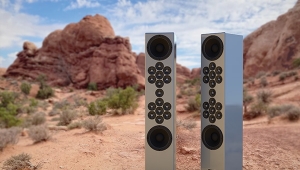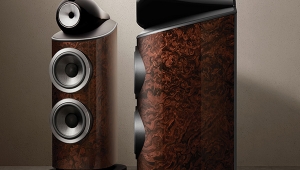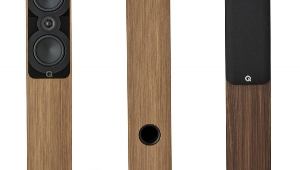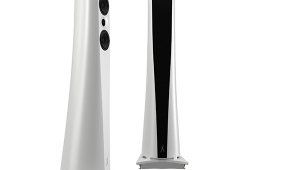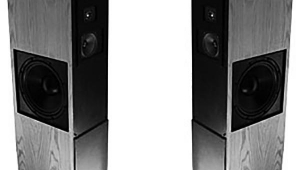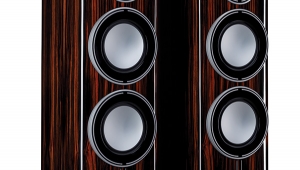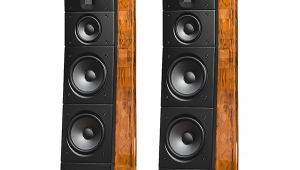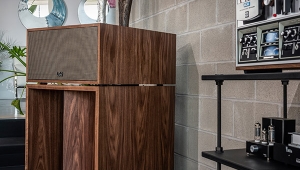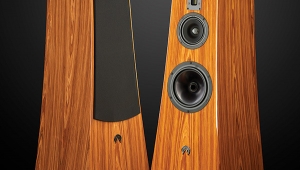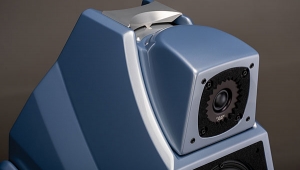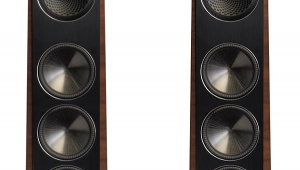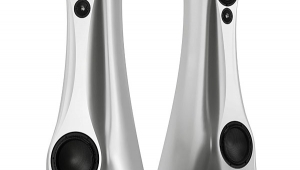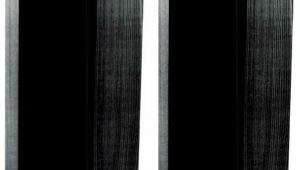| Columns Retired Columns & Blogs |
Wilson Audio WATT/Puppy System 5 loudspeaker Page 5
My buddy Ruben, a lutenist who also plays electric geetar (as he would have it) in a noise-rock band, maintains that since the 17th century, instrument makers have increasingly opted for volume over tonality. He points to the baroque guitar, which emphasized warmth and an over-rich (to 20th-century ears, at any rate) harmonic signature and contrasts it to a contemporary concert instrument which is a lot louder and has greater sustain, but at a sacrifice in the seductive body of the tone.
Look at keyboard instruments: far from being a parlor instrument, an unamplified piano these days may reach 4000 listeners at a solo concert. Yet, to hear a late Schubert sonata on a fortepiano is to understand how connected the composition is to the instrument it was composed upon—the difficulty of really pounding out the left-hand lines, while balancing them dynamically to the right-hand parts, is so great that players on modern instruments often squander much of the passion written into those phrases. Does the Wilson personify a particularly modern hunger for clarity and dynamic impact?
Watt chu say!
"What," asked Charles Ives, "has sound to do with music?" That is the question here, isn't it? I've stated that I have never heard more of what is on a recording than I have with the WATT/Puppy; furthermore, I have adjudged the speaker tonally neutral. Transparent. How do I proceed from that to the conclusion that, on some level, something I demand from musical reproduction remains tantalizingly out of this speaker's reach? Struggle as I will, I can't reconcile this paradox. One possible answer is that I've been programmed by our audiophile vocabulary—in which the word "accurate" is all too frequently invoked with a slight sneer, containing the implication that accuracy somehow misses the musical point. I don't think so, but then I'd be the last to know, wouldn't I?
But consider this: Music is a system through which we experience profound emotional and aesthetic reactions, yet the mechanism by which such communication occurs is at best only crudely understood. Stokowski claimed that "music is by nature remote from the tangible and visible things of life." George Szell defined its paradoxical nature by saying, "Music is indivisible. The dualism of feeling and thinking must be resolved to a state of unity in which one thinks with the heart and feels with the brain." It is, most certainly, hubristic of me to think that I might fathom its mechanisms simply though the contemplation of a loudspeaker, no matter how superb that speaker may be. Yet that is precisely the level of examination that the WATT/Puppy demands.
Most listeners, I imagine, won't understand what my problem is. Listening to a speaker that possesses the levels of clarity, articulation, neutrality, transient quickness, and vanishingly low levels of coloration that the WATT/Puppy 5 exhibits, they'll simply goggle in amazement, gasping, "You got a problem with that?" I understand this—I ask myself the same question.
Watt's what & that's that
But I'd be remiss if I left the story there; it has an epilogue that throws all of my maundering into a different light. As I said earlier, my wife and I moved to New Mexico after I'd done the bulk of the critical listening for this review—most of my conclusions and descriptions derive from five months of listening conducted in our Brooklyn apartment. We disassembled the stereo several days before moving and, although we had music in our car driving across the country, and rigged up a makeshift stereo while unpacking in Santa Fe, we were without a real hi-fi for about five weeks.
Finally, when all of our books and records were unpacked and mounds of boxes no longer dominated our rooms, I got a chance to install our primary system in our new living room. I busied myself with the minutiae of setup because that's what audiophiles do, little thinking that I was about to experience a profound catharsis. My wife helped me level the speakers and we sat down to listen to Joshua Redman's MoodSwing CD (Warner Bros. 45643-2). The instant we heard that Texas tenor, so full of breath and thick with body, our eyes met. Two thousand miles and two time zones disappeared—we were home.
And a speaker that can do that is probably worth $15,000.
- Log in or register to post comments
